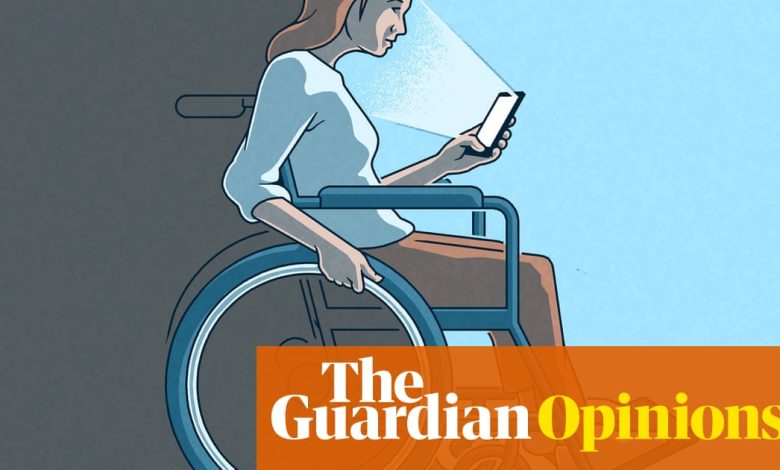Meet the ‘sickfluencers’ of TikTok – and don’t be fooled by the outrage obscuring the real scandal | Frances Ryan

hHave you heard of “sickfluencers”? I admit the phenomenon passed me by until this week. “Sickfluencer” sounds like a term that describes the world’s least ambitious Instagrammer, where instead of trips to Bali and fine jewelry, brands ship codeine and incontinence pads. #gifted #bestlife
It is actually about the disability benefits system. But then what isn’t these days? Just a week after the government published its white paper on unemploymentChannel 4 Dispatches: Britain’s benefits scandal reported that disabled and chronically ill social media users – called “sickfluencers” – use platforms such as YouTube and TikTok to share tips on securing disability benefits. Some post template responses that followers can use to fill out their own forms. Others share tips on Facebook and Reddit.
To the rational among us, this may seem perfectly reasonable, not least after a decade of destruction social rights services and cuts to legal aid. When in-person support is removed, those left to fill out long and complicated paperwork on their own – while suffering debilitating symptoms – will naturally turn to online support.
But if the Daily Mail has taught us anything, it’s that rationality has no place in ‘welfare’ discussions. Try unbridled hysteria instead. When former Spectator editor Fraser Nelson investigated the story alongside the wider Dispatches benefits bill this week, his brow furrowed for a full 48 minutes. At one point, Nelson stared at pixelated influencers on her phone with the anguish of a daytime TV host who sees a cowboy builder dressing retirees rather than, say, a mom on YouTube helping cancer patients get money for food.
Scroll Times or GB News reports, and they’re also frantic, breathlessly describing an influencer as a “self-proclaimed anarchist” who suggests his followers tell raters “about your worst day.” Maybe – and I’m just spitting here – it’s because people with variable conditions they are often more likely to be unfairly rejected for benefits.
That ‘sick flexors’ are ‘exposed’ in the context of increasing numbers of people out of work due to illness or disability makes the bottom line clear: claims for disability benefits are skyrocketing not because of NHS waiting lists, rising poverty or a pandemic, but as sneaky crooks help each other mutually game the system.
Of course, this is a deeply nasty narrative in which the desperation of sick people is framed as duplicity. More than that, however, it twists the structural problem of an opaque benefits system defined by bad decisions and mistakes into a story of personal failings. This is a system that asks people with Down syndrome how did they “catch” him and quizzes depressed claimants on why they haven’t killed themselves yet. One so absurdly broken that 70% of appeals are successfuland delays and denials of benefits are a key reason for this the majority of people turning to food banks have a disability.
It’s not hard to see why, faced with this rigged game, some disabled people turn to each other for help to at least understand the rules.
Contrast the frenzy over “sick influencers” giving advice on benefits with the hilarity of television material revealing “pension secrets” or newspapers that promote tax-saving tips to wealthy workers. In fact, just in the past few months, the Times has had numerous articles advising its readers how to lower your tax bill. What is legal for the rich and healthy is fraud for the poor and sick.
If we were honest, we would admit that some take pleasure in judging disabled and chronically ill people, as usually, despite being hyper-paranoid, they gain some advantage (however small). Any disabled driver who has been verbally abused by a stranger for using a blue badge space because they “don’t look like” what they need knows all too well that getting help from the state gives others the green light to control our bodies and behavior.
The rise in claims for disability benefits has only encouraged this, perpetuating the strange idea that illness is something to be wished for rather than avoided. Read the comments below one of the many recent articles on “working Britain” and you will see that much of the general public seems to be channeling Miss Marple if she specialized in opening Munchausen syndrome. Reminiscent of a flurry of articles reasoning that increase in chronic diseases and the rate of ADHD diagnosis may be down to influencers and celebrities talking about them as if long ago Covid was a buzzy new Thai restaurant. Damage is the hot trend for 2024. the same way the bubonic plague was in the 14th century. When you feel like everyone else has an armpit pustule, you just have to have one.
If this is all starting to feel rather ridiculous – and it really should – it might be worth going back to the basics. So here are some eternal truths. Nobody wants to be sick. Very few people enjoy not being able to work. Fraud levels for key disability benefit are effectively zero.
Britain’s social security system is riddled with scandals – just not the kind you hear about. The launch of Universal Credit will make thousands of people disabled significantly poorer. Benefits are already so low that they often don’t cover regular meals or rent. Applicants for disability benefits were left his home because their adapted cars were taken away.
The fact that there is more outrage directed at the sick people who find ways to run this rotten system than the politicians who are responsible for it is the true sign of a sick society. There are people who should be ashamed of themselves for their part in this mess – and it’s not those on TikTok who are crying out for help.


